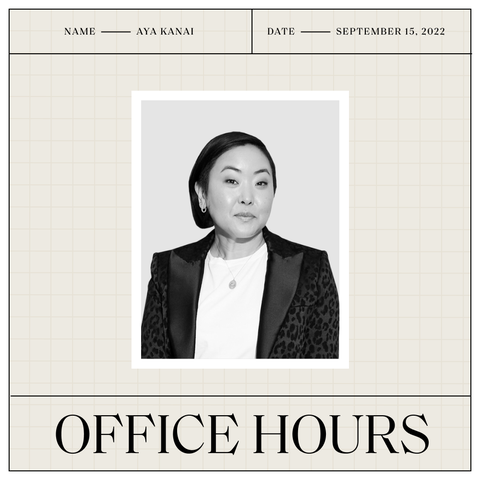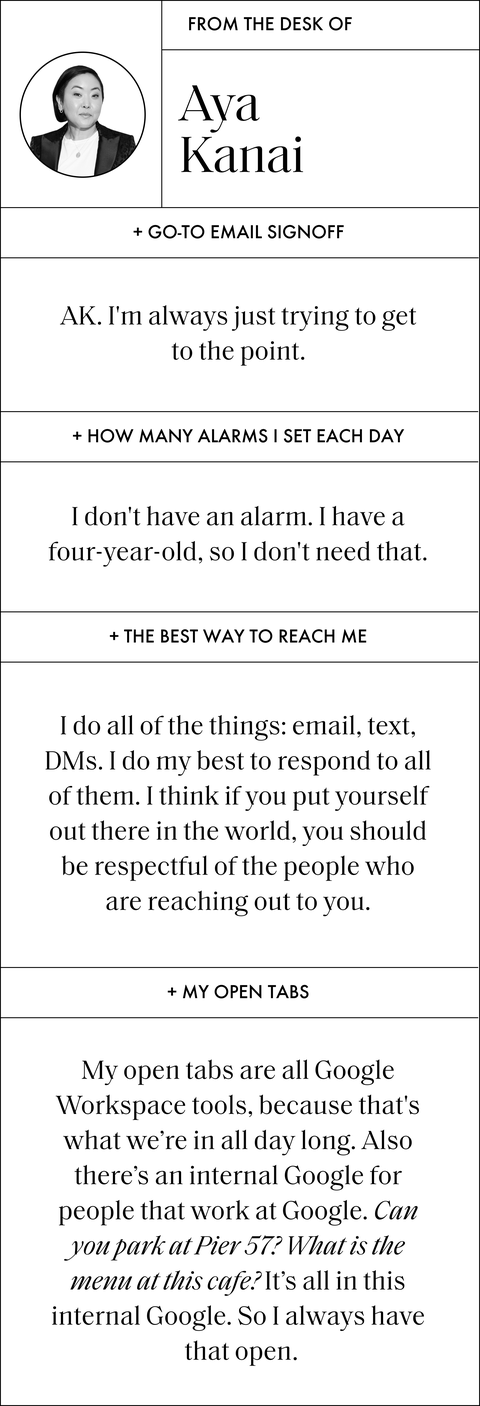In ELLE.com’s monthly series Office Hours, we ask people in powerful positions to take us through their first jobs, worst jobs, and everything in between. This month we spoke with Aya Kanai, whose passion for visual art has taken her from the world of puppet theater to high-rise offices at some of the country’s most popular fashion magazines. She’s been a celebrity stylist, a judge on Project Runway Junior, the editor-in-chief of Marie Claire, the head of content and creator partnerships at Pinterest, and as of recently, the head of editorial and creative at Google Shopping. “I’ve never had a job in marketing before,” Kanai said about taking on her new role. “There is literally so much that I’m learning all the time.” As for how she got there and what she’s learned along the way, Kanai shares it all, below.
My first job
My first job was working at Angelica Kitchen, a vegan restaurant that unfortunately is no longer, which is really sad, because it was a real Lower East Side institution. I went to Oberlin College, and after I graduated, I was trying to become a puppeteer. When you work in the puppetry arts, you don’t make a lot of money, so I combined that with working at Angelica Kitchen in the juice bar, hauling 50-pound bags of carrots up from the basement and preparing takeout. There was a whole crew of people who I think exclusively ate from Angelica Kitchen, so we created these really intense relationships with our customers. It was a super fun, wild job. Working in the service industry, specifically in food and beverage service, is something I would recommend everyone do at some point, just to understand how intense those jobs are and what people around you are going through.
My worst job
When you’re turning 30, you feel this real upheaval in your life of, what am I doing? What is the path? My reaction to that was I was going to move to L.A. and focus on working with celebrity clients. And that was a terrible idea. I am a New Yorker, born and raised. At that point, I had never owned a car. I had never lived in California. I thought, well, I’ve worked with tons of celebrities in a magazine editor capacity. I thought that would translate well into having client work as a celebrity stylist. And it just didn’t. It wasn’t for me. I don’t think I was good at it. What ended up happening was that all of my clients, as a freelance stylist, were in New York. So I was commuting back to New York, making all my money in New York, and then I would fly back to L.A. to sit and be by myself. I realized that didn’t make a lot of sense and ended up moving back.
The reason I studied puppet theater
When I was approaching graduating from college, I knew that I wasn’t ready to get a job, because I didn’t understand exactly what I wanted to do. I wasn’t clear on what would be the next thing for me. I ended up winning the Thomas J. Watson Fellowship, in which you get money to travel the world for a year. The one rule of this fellowship is that you are not allowed to have your feet on American soil at any point throughout the year. You have to be by yourself, go on this journey, do this research project, and then come back and share your findings. It just so happened that my research was about puppet theater, because puppetry art is something that exists in almost every single culture.
How I went from performer to magazine editor
Once I started working as a professional, which would mean performing in various avant-garde puppet theater performances, it was a question of, does the life of being a full-time performer actually suit you? Because studying an art form is very different than participating in it. I realized I loved studying this, and it’s something that really inspires me, but do I need to have this as my job? Is this really the job that I am committing to? Luckily, I had also done several internships at fashion magazines when I was in college. At that time there was a brand-new magazine starting called Teen Vogue. So I applied to be a fashion assistant, and I was part of the original staff of Teen Vogue. I had multiple different passions; all of them were always focused on visual art and creativity, but it was more about choosing a path.
Why I was inspired to bring my editorial experience to Google
What’s exciting for me, as an editor, is that Google is not a retailer. We’re not a marketplace. My sole goal is to help consumers understand this is a commerce ecosystem where they can find products across a variety of different retailers. Coming to Google, there was this huge opportunity to help consumers make the most educated purchases they humanly can. Because really, the most sustainable way to shop is to shop in an educated way, where the purchase you’re making is something you know you have vetted properly and really want.
How I got over being nervous at my new job
I definitely was nervous to come to Google. What are the people going to be like? The same way you feel when you’re entering high school. Are people going to like me? Is this the right place for me? All those questions, I had them. Then, of course, you come to work here, and you’re like, “Oh, it’s normal. They’re just human beings. I am one of them.” I have a completely different path to getting here than most other people; I definitely felt nervous about it. I would say it went away in a week or so.
Why I often talk about motherhood and fertility
The reason I’ve been so open about going through multiple fertility treatments is because, when I was in my late 20s, early 30s, I wasn’t hearing people talk about that. In my 20s and early 30s, I was really only about advancing my career and making sure I was doing the most all the time. Because of that, I looked up at the age of 35 and started thinking, if I don’t have a partner that I’m going to have a family with now, maybe I should do some sort of precautionary measures. That meant freezing my eggs, which ultimately ended up being the reason why I was able to become a mom many, many years later. The balance that’s always hard is that I’m not trying to fear monger. For younger women who don’t want to do that, totally fine. I’m just saying I wish I had known it was an option even younger than 35. Having it be a normal part of conversation and not pressuring one way or the other, that’s what I think is useful.
This interview has been edited and condensed.
Madison is a senior writer/editor at ELLE.com, covering news, politics, and culture. When she’s not on the internet, you can most likely find her taking a nap or eating banana bread.


